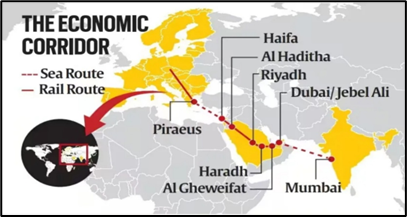Why in news?
India’s National Security Council Secretariat recently hosted officials from the U.S., UAE, Saudi Arabia, France, Italy, Germany, Israel, Jordan, and the EU to review progress on the India-Middle East-Europe Economic Corridor (IMEC).
This article deals with the corridor’s ambitions, challenges, and future prospects.
What’s in Today’s Article?
- About India-Middle East-Europe Economic Corridor (IMEC)
- IMEC’s Promise and the Geopolitical Opening That Enabled It
- Gaza War Turns IMEC’s Challenges into Fundamental Obstacles
- IMEC’s Future Hinges on Middle East Stability and Conflict Resolution
About India-Middle East-Europe Economic Corridor (IMEC)

- Announced at the 2023 G20 Summit in New Delhi, the IMEC aims to boost economic development through enhanced connectivity between Asia, the Arabian Gulf, and Europe.
- It consists of two segments:
- India-Gulf corridor, linking India’s western ports to the UAE and then via high-speed freight rail through Saudi Arabia and Jordan to Haifa, Israel; and
- Gulf-Europe corridor, connecting Haifa to Greece and Italy by sea, followed by onward transport through Europe’s rail networks.
- Expected to reduce India-Europe shipping times by about 40% compared to the Red Sea route, the project has seen limited progress since its launch.
IMEC’s Promise and the Geopolitical Opening That Enabled It
- The IMEC was conceived during India’s G20 Presidency in September 2023, at a rare moment of Middle East stability following years of regional rivalries.
- Arab normalisation with Israel, which Saudi Arabia was poised to join, created conditions for India, Middle Eastern states, the U.S., and Europe to envision a corridor connecting India to Europe.
- The economic case was strong — the EU is India’s largest trading partner, with FY 2023-24 bilateral trade at $137.41 billion, and non-oil trade with the UAE and Saudi Arabia rising significantly.
- Planned as more than a trade route, IMEC aimed to integrate electricity and digital connectivity cables, clean hydrogen pipelines, and measures to boost efficiency, reduce costs, create jobs, and cut emissions.
- It sought to address persistent trade challenges, including lack of tariff standardisation, low financial integration, limited corridor-wide insurance, and varying port capacities, while building a cross-Saudi/UAE railway to link its sea legs.
- Although these were considered manageable through investment and cooperation, the project stalled when, less than a month later, the region was plunged into ongoing conflict, preventing the first stakeholder meeting from taking place.
Gaza War Turns IMEC’s Challenges into Fundamental Obstacles
- While the IMEC’s economic rationale remains strong, its hurdles have shifted from manageable to fundamental due to Israel’s ongoing war on Gaza, which has strained regional ties.
- The corridor’s key Middle East-Europe link depends on Jordan-Israel cooperation, now at a low point amid tensions over Palestinian displacement.
- Prospects for Saudi-Israel normalisation have also diminished, with Riyadh demanding Palestinian concessions that Israel is unwilling to make.
- The war’s expansion into Lebanon, Yemen, Syria, Iraq, and tensions with Iran heightens insurance costs for regional trade, further complicating implementation.
- Ironically, despite hindering progress, Israel sees the IMEC as crucial to deepening its economic integration with the Arab world, excluding Palestine.
- Prime Minister Netanyahu has termed framed of the project as a geopolitical blessing for participating states.
IMEC’s Future Hinges on Middle East Stability and Conflict Resolution
- While the IMEC’s western leg faces uncertainty, India’s strong strategic and economic ties with the UAE and Saudi Arabia keep prospects for its eastern leg alive.
- Initiatives like UPI integration enhance digital connectivity potential, but intra-Gulf economic rivalries, such as Saudi measures to counter Emirati dominance, hinder unified corridor planning.
- For the IMEC to match its 2023 vision, the regional stability that enabled its conception must be restored — a goal tied to resolving the Palestinian statehood issue.
- Growing global recognition of the need to end Israel’s Gaza war, reflected in actions like Germany halting certain arms shipments to Israel, underscores this reality.
- Until lasting peace is achieved, IMEC remains a “day-after” project, with current efforts limited to planning and trade facilitation.










